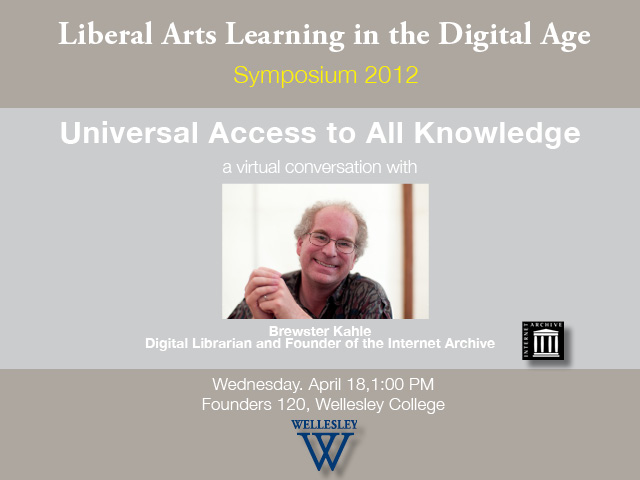http://www.youtube.com/watch?v=xhd1dF6yYns
- 0:00:00 Introductions
- 0:00:42 Universal Access to all Knowledge, Brewster Kahle
- 0:38:32 Q&A
Join the conversation by posting a comment or on Twitter using the hashtag #wellesleyUA
Advances in computing and communications mean that we can cost-effectively store every book, sound recording, movie, software package, and public web page ever created, and provide access to these collections via the Internet to students and adults all over the world. By mostly using existing institutions and funding sources, we can build this as well as compensate authors within the current worldwide library budget. Technological advances, for the first time since the loss of the Library of Alexandria, may allow us to collect all published knowledge in a similar way. But now we can take the original goal another step further to make all the published works of humankind accessible to everyone, no matter where they are in the world.
Thomas Jefferson’s statement that “All that is necessary for a student is access to a library” may be an exaggeration, but access to information is a key ingredient to education and an open society.
Will we allow ourselves to re-invent our concept of libraries to expand and to use the new technologies? This is fundamentally a societal and policy issue. These issues are reflected in our governments’ spending priorities, and in law.
Bio from http://archive.org/about/bios.php:
Brewster Kahle, Digital Librarian and Founder of the Internet Archive, has been working to provide universal access to all knowledge for more than twenty-five years.
Since the mid-1980s, Kahle has focused on developing technologies for information discovery and digital libraries. In 1989 Kahle invented the Internet’s first publishing system, WAIS (Wide Area Information Server) system and in 1989, founded WAIS Inc., a pioneering electronic publishing company that was sold to America Online in 1995. In 1996, Kahle founded the Internet Archive which may be the largest digital library. At the same time, he co-founded Alexa Internet which helps catalog the Web in April 1996, which was sold to Amazon.com in 1999.
Kahle earned a B.S. from the Massachusetts Institute of Technology (MIT) in 1982. As a student, he studied artificial intelligence with W. Daniel Hillis and Marvin Minsky. In 1983, Kahle helped start Thinking Machines, a parallel supercomputer maker, serving there as a lead engineer for six years. He serves on the boards of the Electronic Frontier Foundation, Public Knowledge, the European Archive, the Television Archive, and the Internet Archive.

